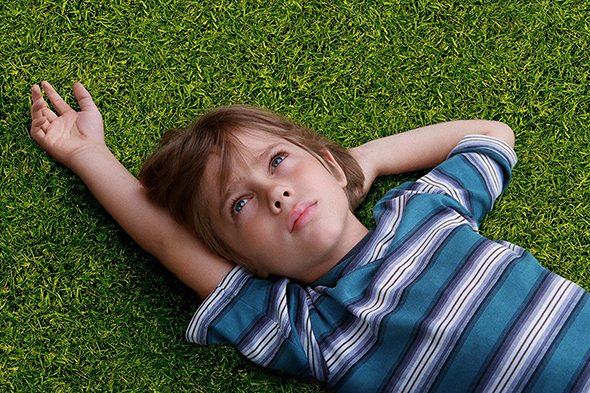
There’s never been a movie quite like Boyhood before.
Filmed over the course of 12 years, Richard Linklater’s drama depicts the life of its central character from age 6 to 18, utilizing all the same actors along the way. Sure, other cinematic endeavors have allowed people to age in front of our eyes — notably the Up! documentary series or Linklater’s own Before Sunrise trilogy — but never before has that feat been accomplished in a single narrative film.
The seamless aging of its characters adds a transfixing realism to Boyhood. As moviegoers, we’ve grown accustomed to the jarring cut from a younger actor to an older one of limited resemblance. Those shifts are also a way to neatly divide a film into eras and acts (think Cinema Paradiso‘s preadolescent, teenaged, and middle-aged Totò). And while we still notice those sometimes-jarring replacements, we accept them as a necessity.
But by having the main character Mason Jr. (played by the unknown Ellar Coltrane) age gradually before us, Boyhood denies us those neat divisions. Instead, it envelops us in the way that lives really unfold: languidly at times, suddenly at others, and without discernible structure. Of course, the genius of its premise would be wasted if the movie weren’t any good. Luckily, it is.
Boyhood begins with Mason Jr. in first grade, living in Texas with his mother (Patricia Arquette) and sister (Lorelei Linklater, real-life daughter of the director). Mason’s estranged father (Ethan Hawke) is a charming but irresponsible man, flitting in and out of his children’s lives while Arquette is forced to shoulder the daily — and financial — burdens.
The film follows the children throughout the years as they move to different towns, attend different schools, and generally discover who they are. Linklater cleverly marks the passage of time with technology (he lingers on each era’s computers, video game consoles, and phones) and through music (Coldplay and Sheryl Crow give way to The Black Keys and Gotye).
There are a few big dramatic sequences in the film, mostly thanks to the abuses of some drunken would-be father figures. But Boyhood is more concerned with the subtler, less explosive events that can color a childhood. Those lyrical moments take the form of camping trips, beer-addled boasting sessions with friends, fleeting flirtations with coworkers, and backseat makeout sessions.
By the film’s end, Mason Jr. has grown into a quiet, pensive young man with a flair for photography. That arc is one of Boyhood‘s only major missteps. Whereas the younger Mason Jr. draws his appeal from his Everyman (or should we say Everyboy) qualities — he’s not a particularly gifted student, he gets into trouble at school, etc. — the high school version of the character is a different animal altogether.
The final act of the movie is mostly comprised of Mason Jr. winning a photography competition and people repeatedly telling him how talented he is (shades of Cinema Paradiso again). Richard Linklater based much of the film on his own life, and while it may have been his experience that everybody gushed over his then-burgeoning talents, having Mason Jr. morph into a sullen genius robs Boyhood of much of its relatability.
And as Mason Jr. becomes more self-involved, Coltrane’s performance becomes blander. Despite being the film’s center, Mason Jr. is rarely more than a cipher for other characters to espouse wisdom and platitudes at. In one of her finest performances, Patricia Arquette fares much better. As the single mother who puts herself through college, becomes a professor, and escapes the wrath of two alcoholic husbands, it’s Arquette who gives the film much of its heart (despite Mason Jr., and through him the film, being more enamored with Hawke’s easygoing character).
But whatever faults Boyhood has, they’re minor ones. Despite its near-three-hour running time (and it featuring at least one life-affirming pep talk too many), the film never wears out its welcome. It’s such a joy to see these characters — even the supporting ones — grow and evolve onscreen. Linklater has created a singular film that, at least for a while, speaks to the child in all of us. He may have trouble sticking the landing, but it’s still a glorious flight.
Boyhood opens at Landmark Hillcrest Cinemas on Friday, July 18.